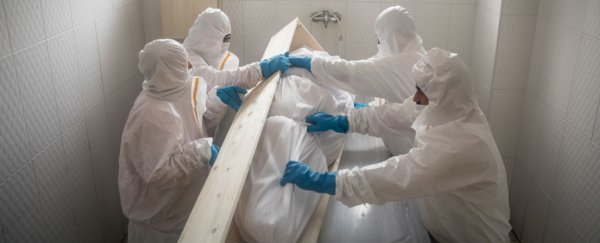Right now, a global infection is spreading from person to person, leading many to sickness and even death. We are not talking about the coronavirus. But it goes hand in hand with this other insidious plague.
The global spread in question is what researchers call an infodemic – an oversupply of information, carrying with it fake news, rumours, and conspiracy theories that put people in harm's way. Bad ideas and poor advice, shared amongst friends, family, and total strangers alike.
In theory, an infodemic could attach to anything. This time, it's COVID-19. And it's a hugely serious problem that amplifies and extends the already grave dangers of the coronavirus crisis.
In a new study, an international team of infectious disease researchers scoured social media and news websites to monitor how COVID-19 misinformation was circulating on online platforms.
In total, they identified over 2,300 reports of COVID-19-related rumours, stigma, and conspiracy theories, communicated in 25 languages from 87 different countries.
None of this misinformation is helpful – even if it's intended to be – and much of it is harmful. In some cases, it's lethal, leading to preventable death and injury on a truly tragic scale.
"For example, a popular myth that consumption of highly concentrated alcohol could disinfect the body and kill the virus was circulating in different parts of the world," the authors write in their study.
"Following this misinformation, approximately 800 people have died, whereas 5,876 have been hospitalised and 60 have developed complete blindness after drinking methanol as a cure of coronavirus."
That incident, centred in Iran, might be the worst example of infodemic-related death, injury, and misery. But it's far from the only one the team found.
A similar event claiming the lives of 30 people was reported in Turkey, the researchers say, while in Qatar, two men died from ingesting either surface disinfectant or alcohol-based hand sanitiser.
In India, a dozen people became ill after drinking alcohol made from toxic datura seeds, having watched a video on social media that claimed it would boost their immunity against COVID-19. Five of the imbibers were children.
Of course, not every dangerous fallacy about coronavirus leads to hospitalisations that make headlines. Yet so many twisted ideas are out there and being shared, the researchers found, which people suggest can kill, cure, or prevent coronavirus – things like drinking bleach, drinking cow urine and cow dung, ingesting silver solution, or spraying chlorine all over your body.
In the midst of this swirl of misinformation, even relatively benign mistruths can become dangerous in the wrong hands, the researchers say.
"A church in South Korea, where a spray bottle was used to spray salt water among the church attendees, resulted in more than 100 infections among the attendees because of spraying contaminated water," the team explains – describing an incident in which the nozzle of a spray bottle was repeatedly put inside the mouths of different members of the congregation, without being disinfected.
The infodemic doesn't just perpetuate claims about false cures, though. It also has a lot to say about the origins of coronavirus, how you can catch it, and racial aspersions about who's to blame.
Some from the long list of examples includes: coronavirus is a type of rabies; mobile phones can transmit coronavirus; coronavirus is an engineered bio-weapon; coronavirus was made to sell vaccines; coronavirus was manufactured by the Bill & Melinda Gates Foundation/Donald Trump/the CIA/China (etc.); coronavirus is a population control scheme. And so on, and so on.
The researchers acknowledge a number of limitations to their study, and point out that they didn't investigate or follow up on the misinformation they discovered online, nor determine the number of people who believed in any given rumour or conspiracy.
Nonetheless, they did find all this misinformation freely circulating on publicly accessible websites and social media. That's the heart of the issue: the coronavirus infodemic is out there for all to see – and it's a problem we need to actively counter, the researchers say.
"Misinformation fuelled by rumours, stigma, and conspiracy theories can have potentially serious implications on the individual and community if prioritised over evidence-based guidelines," the team writes.
"Health agencies must track misinformation associated with COVID-19 in real time, and engage local communities and government stakeholders to debunk misinformation."
The findings are reported in The American Journal of Tropical Medicine and Hygiene.
